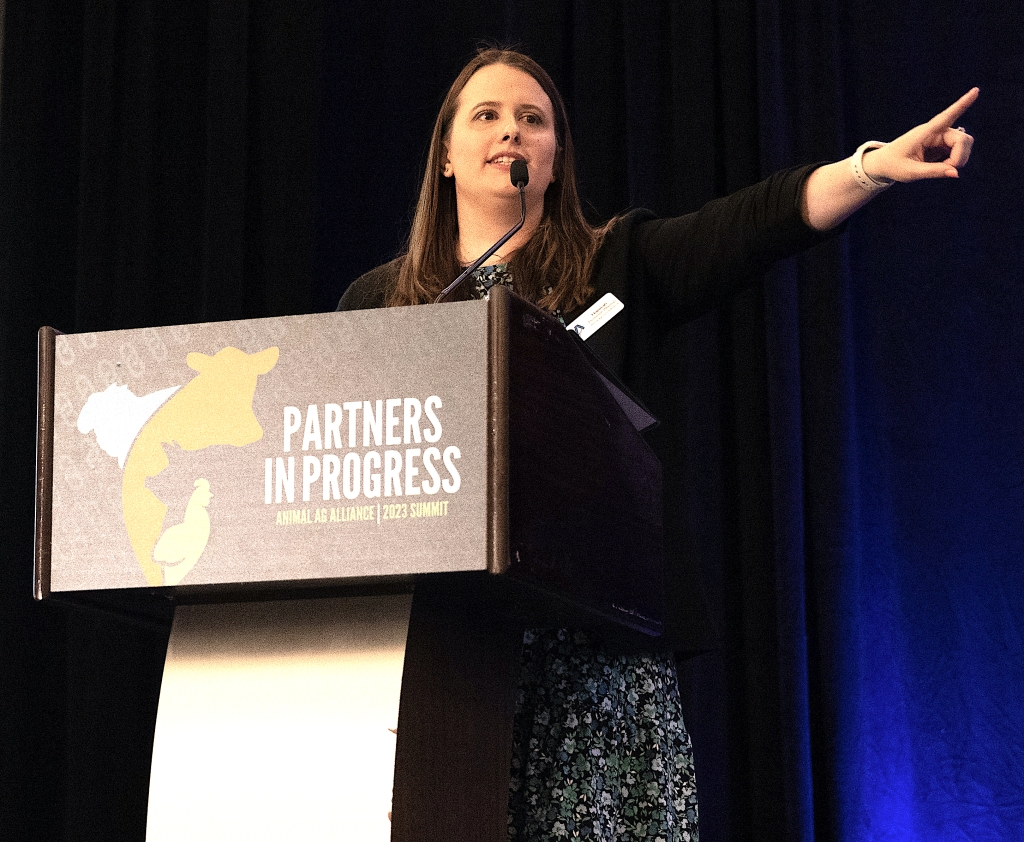
In California’s Proposition 12, legislation aiming to reshape the landscape of animal agriculture, Hannah Thompson-Weeman, the president and CEO of the Animal Agriculture Alliance, takes center stage.
“Nearly 23 days into its implementation, Proposition 12 has cast a shadow of uncertainty, prompting more questions than answers.”
Thompson-Weeman sets the stage by unravelling the reactions from pork producers, who grapple with the dual challenge of navigating uncertain markets and ensuring compliance without compromising the affordability of their products.
Hannah said this struggle extends beyond California, resonating across the nation’s hog-producing community. The call to action is clear as the alliance, representing members in the pork industry, advocates for Congress to intervene and provide a viable solution to the intricate problems arising from Proposition 12.
The legal backdrop, Thompson-Weeman emphasizes, is crucial to understanding the situation’s complexity.
Proposition 12 faced challenges from its inception, with California voters passing a nationwide law with far-reaching implications for hog producers. Despite legal battles and Supreme Court hearings, the decision to implement Proposition 12 stood, resulting in a convoluted timeline marked by changes, delays, and eventual enforcement on January 1st.
Yet, uncertainty looms large. Thompson-Weeman highlights the key concerns regarding market dynamics, product availability, and pricing.
“A mere four per cent of U.S. producers, approximately 1200, currently meet the compliance standards, raising alarming questions about the adequacy of pork products in the Californian market,” said Hannah.
Thompson-Weeman delved into the intricate certification process.
“Producers find themselves entangled in a bureaucratic maze, with certifications oscillating unpredictably. The need for clarity on who can certify, the authority for enforcement, and the compliance standards create additional hurdles.”
Thompson-Weeman stresses that the certification process remains a significant enigma, further contributing to the overarching uncertainty in Proposition 12’s ongoing implementation.
Financial implications come to the forefront of the discourse. Thompson-Weeman acknowledges the monumental challenge producers face in turning a profit under the stringent regulations of Proposition 12.
“I’ve heard producers who believe their barns meet the standard, but they haven’t been able to follow through on that certification process that will allow them to sell the product,” said Hannah. That was another question mark throughout the implementation: who can certify, who’s allowed to certify, and who has the ultimate enforcement authority.
“It goes back to the idea that we still have many questions surrounding this implementation and the long-term impacts.”
She contends that the legislation’s proponents, primarily animal rights activist organizations, intended to drive up costs intentionally.
“It forces producers into difficult decisions, ultimately passing these financial burdens onto consumers,” she said.
The debate transcends the realm of animal welfare, underscoring the economic strain on producers and consumers alike.
As the narrative shifts to 2024, Thompson-Weeman provided insights into the broader legislative landscape. States witness an uptick in activist-driven legislation following the perceived success of Proposition 12.
In early 2024, the Animal Agriculture Alliance president said they’re seeing a lot of other legislative activity. This beginning of the year is a hectic time for state legislatures in the U.S.
“We’ve seen an uptick in activist push legislation following the victory of Prop 12.”

New York has a few bills similar in content to Prop 12 dealing with the housing of pigs in that state. Oklahoma has some legislation called the Pregnant Pigs Pilot Program that would look at changing and funding changes to sow housing for hog producers in the state. New Jersey passed legislation last year that was similar to Prop 12. Then, there are a few other local initiatives the Animal Alliance follows. Berkeley, California, activists are pushing for a resolution that they’re calling a factory farm band. In Sonoma County, California, they’re also going for a citizen ballot initiative restricting the size of farms in Sonoma County and Denver. A city-level push to ban processing plants in Denver would put a lamb processing facility out of business if that were to pass. So, a lot is going on legislatively down to the city level.
In conclusion, Thompson-Weeman urges stakeholders to immerse themselves in the ongoing discourse. The Animal Agriculture Alliance’s upcoming annual stakeholder summit in Kansas City, Missouri, on May 8th and 9th, emerges as a critical platform for comprehensive insights. The promised legislative and legal session during the summit beckons as an invaluable opportunity for sustained dialogue, fostering a deeper understanding of the agricultural community’s persistent challenges. Proposition 12 remains an unfolding saga, and Thompson-Weeman’s insights provide a compass for navigating the intricate terrain of animal agriculture regulations. •
— Harry Siemens





